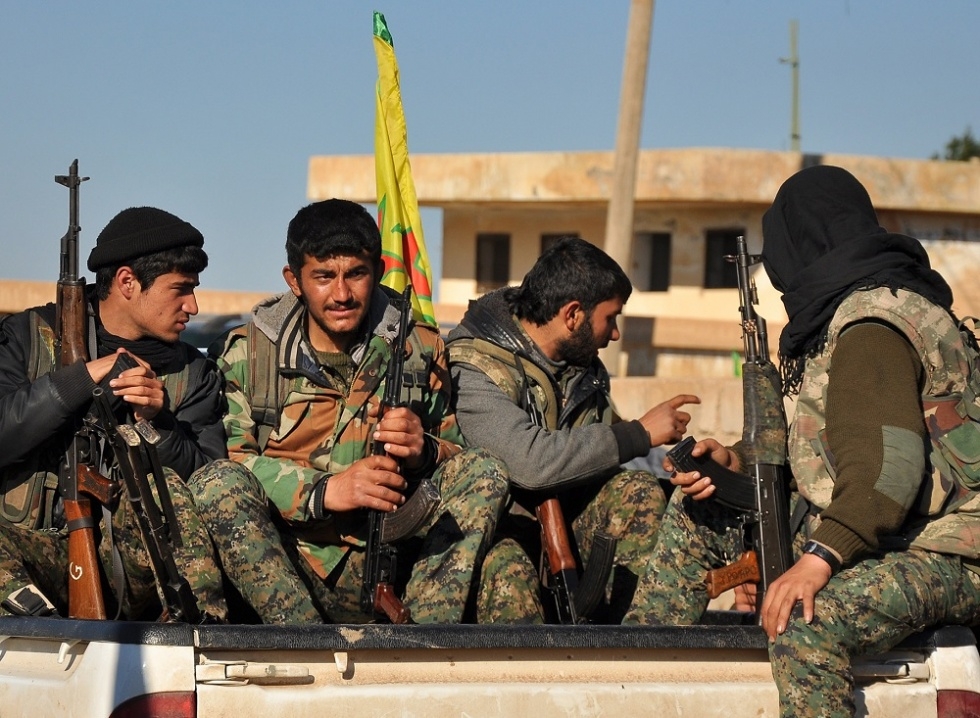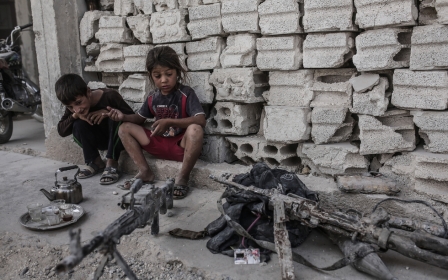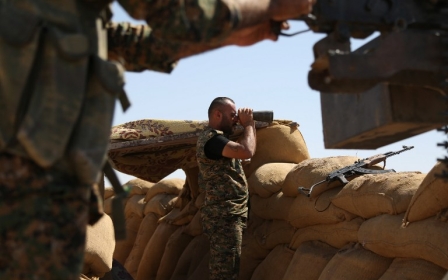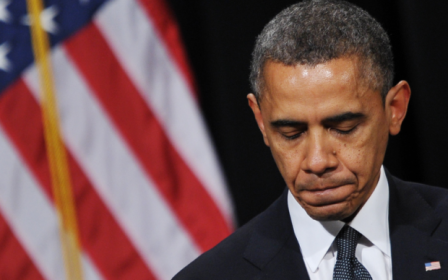Questions over US forces in Syria highlight fears of Russia-US showdown
With a spotlight on US and Russian military deployments in Syria, analysts have begun weighing up the chances of a proxy war

Photo shows Kurdish troops in Syria
Published date: 18 September 2015 00:20 BST
|
Last update: 9 years 2 months ago
UNITED NATIONS, United States - The United States has long stated that it has no military “boots on the ground” in Syria. The veracity of that statement – together with the wisdom of limiting its campaign to airstrikes – has been questioned for almost as long.
This issue came to the fore again on Wednesday, when General Lloyd Austin, head of the US military’s Central Command, said that US special operations forces were indeed on the ground in Syria and helping Kurdish troops fight the Islamic State (IS) group.
Later the same day, the US military backtracked on his statement to the Senate Armed Services Committee. Instead, the US has only supported Kurdish forces in their battle against IS from the other side of the Iraqi border, it said.
But, coming against a backdrop of a Russian military buildup in Syria to assist the country’s embattled President Bashar al-Assad, the incident raises fresh questions about this latest phase of Syria’s four-year-old civil war.
Analysts have questioned the likelihood of Syria becoming a proxy battleground between Washington and Moscow. The UN has warned of a deepening crisis that will be exacerbated by outside military interference.
Speaking before Congress, General Austin said that US special operations forces had engaged with the Kurdish fighters in the People’s Protection Units (YPG) and other forces in northern Syria since the start of the conflict in 2011.
“What our special operations forces have done in northern Syria … at the very onset, they began to engage elements like the YPG and enable those elements, and they are making a difference on the battlefield,” he said.
Austin’s comments were at odds with US President Barack Obama’s past statements about the war. The commander-in-chief says IS will be destroyed via air strikes from a US-led coalition but without US “boots on the ground” in Syria.
Despite this, it is understood that the US has carried out some strikes at ground level, including a US special forces team reportedly killing Abu Sayyaf, a senior IS commander who helped direct oil, gas and financial operations, in May.
Also, a document from the security firm Stratfor released by the whistle-blowing website WikiLeaks in 2011 suggested that there had potentially been US special forces on the ground in Syria since that year.
Austin’s comments may also impact Washington’s relationship with its NATO ally, Turkey. Ankara is currently fighting the Kurdistan Workers’ Party (PKK), a group that is ideologically and strategically linked to the YPG in Syria.
In a clarification, the US military backtracked on Austin’s testimony. “There are no US military forces on the ground in Syria, nor have we conducted any US military training of indigenous Syrian forces in Syria,” it said in a statement.
“Coordination and liaising by US forces is conducted outside of Syria … in northern Iraq.”
Questions over US military involvement in Syria came as Russia is boosting its presence in Syria to back Assad’s forces, which are losing ground to a patchwork of Islamist and moderate anti-government militias in a war that has claimed some 240,000 lives.
A Pentagon spokesman said on Monday that flows of people and equipment indicate Moscow is establishing a “forward air operating base” at an airport near the north-western city of Latakia, a stronghold of the regime and Assad’s traditional heartland.
Other reports indicate Moscow has sent aircraft and two tank-landing ships to Russia’s naval base in the coastal Syrian city of Tartus.
Russian President Vladimir Putin has pledged ongoing military support for Assad in “countering the terrorist aggression” of IS. He warned that flows of Syrian refugees to Europe would be “even bigger” without Russian help.
Along with Turkey, Jordan and other neighbouring nations, Greece, Germany, Hungary and other European countries have been overwhelmed in recent weeks by large influxes of refugees from Syria and other turbulent nations.
But Moscow’s military buildup has sparked alarm in the West just as the US, Gulf countries and Russia were working on a new push for peace, with the UN envoy for Syria due to open talks in Geneva this month.
On Wednesday, US Secretary of State John Kerry warned that Moscow’s support for Assad would escalate the crisis and urged Moscow to play a “constructive role” in finding a political solution in Syria and the fight against IS.
“I made clear that Russia’s continued support for Assad risks escalating the conflict and undermining our shared goal of fighting extremism,” Kerry told reporters a day after talks with his Russian counterpart Sergei Lavrov.
UN Secretary-General Ban Ki-moon warned against foreign military involvement in the Syrian war. “I am concerned by the parties arming and providing arms,” Ban told reporters. “There is no military solution – only a political solution,” he added.
According to Jonathan Cristol, a scholar at the World Policy Institute think tank, the US most likely does use limited ground troops in Syria – despite the US military’s retraction of Austin’s comments.
“If the US has no presence at all in Syria then ultimately we’re not doing our jobs,” he told Middle East Eye.
“But training foreign fighters and sending a few operatives across borders for training work and intelligence is not a particularly dramatic escalation of the US role in Syria.”
The US was likely to limit its military footprint in Syria for fear of a “proxy war” with Russia, he added.
“Both Russia and the US have incentives to fight IS. If the fight is targeted against IS, and the Islamists are defeated or scaled back, then that can only be a good outcome for Assad, and his supporters in Moscow,” he said.
“Even for Syria, it could be argued that it is the best outcome.”
Faysal Itani, a Syria expert at the Atlantic Council, said a US military escalation in response to Russian action in Syria was not likely.
“As Russia’s military footprint in Syria grows, US options will only decrease and the risk of US action increase,” he told MEE.
“The Syrian opposition may have just gained a formidable enemy in Russia, even as the US train-and-equip programme is collapsing.”
The presence of Russian forces made it harder for the US to implement an anti-IS safe zone or no-fly-zone over northern Syria,” Itani added.
“As for the deployment of US ground troops: this is not impossible if it is limited to targeting IS, but most certainly would not aim to counter the Russian military escalation which is, in reality, aimed at the insurgency, not IS,” he said.
New MEE newsletter: Jerusalem Dispatch
Sign up to get the latest insights and analysis on Israel-Palestine, alongside Turkey Unpacked and other MEE newsletters
Middle East Eye delivers independent and unrivalled coverage and analysis of the Middle East, North Africa and beyond. To learn more about republishing this content and the associated fees, please fill out this form. More about MEE can be found here.




